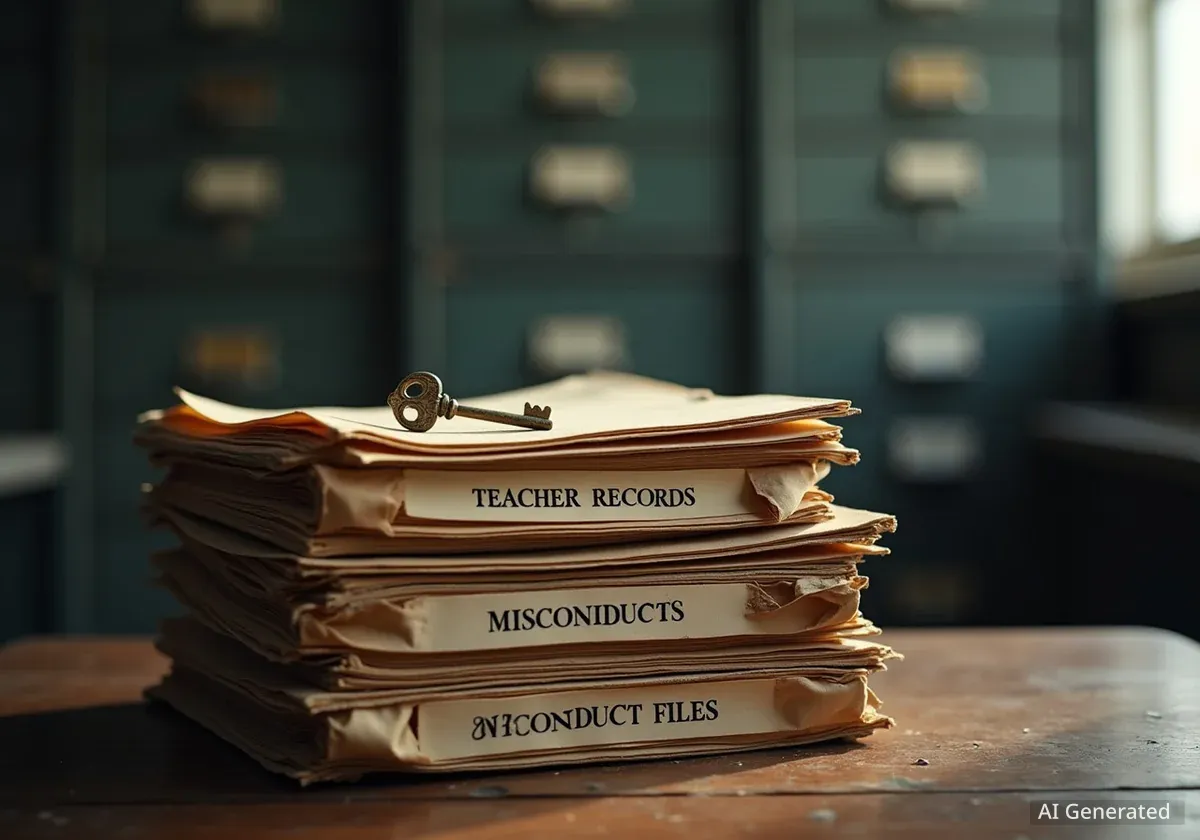An investigation into how Wisconsin's largest public school districts handle educator sexual misconduct has revealed significant barriers to public information. Districts are quoting exorbitant fees, sometimes reaching hundreds of thousands of dollars, to produce public records, citing disorganized and burdensome filing systems that government transparency advocates say obscure accountability and may put students at risk.
When asked for records related to investigations into sexual misconduct, harassment, and inappropriate relationships with students, several of the state's 20 largest districts responded with cost estimates that effectively prevent public access. These responses highlight a lack of systematic tracking for such complaints, with some officials admitting records are scattered across thousands of individual paper files.
Key Takeaways
- Wisconsin school districts quoted fees up to $245,000 for public records on teacher sexual misconduct investigations.
- Many districts lack organized, searchable systems for tracking misconduct complaints, citing this as the reason for high costs.
- Transparency advocates argue these high fees and poor record-keeping practices prevent public oversight and accountability.
- In some cases, districts initially claimed no records existed, only to produce them when specific names were provided.
- Experts say a failure to track these incidents is a missed opportunity for prevention and shows that student safety may not be a top priority.
A Prohibitive Price for Public Information
Requests for public records on teacher misconduct have been met with staggering financial demands from several Wisconsin school districts. The School District of Janesville, the state's ninth-largest, initially quoted a fee of more than $245,000 to fulfill a request for documents.
District officials calculated this estimate based on an employee, earning $35.54 per hour, needing approximately 6,900 hours to search for the relevant files. This is equivalent to one full-time employee working for nearly three and a half years on this task alone.
Other districts also presented significant financial hurdles. The Middleton-Cross Plains Area School District estimated a cost of $40,000, while the Sheboygan Area School District quoted over $17,000. The Stevens Point Area School District requested $1,500 just to begin its search.
In each case, administrators argued that the records were not centrally located or categorized by the type of misconduct. They claimed that fulfilling the requests would require a manual review of thousands of individual personnel files, many of which exist only in paper form.
The Role of Open Records Laws
Wisconsin's open records laws are designed to ensure government transparency by allowing the public to access official documents. However, government bodies can charge for the "actual, necessary and direct cost" of locating and reproducing records. Advocates worry that excessively high location fees, like those quoted by the school districts, can be used to deter legitimate public interest inquiries.
Disorganized Systems and Missing Files
The high cost estimates point to a deeper issue: a systemic failure in record-keeping. Several districts, including Racine and Waukesha, initially denied requests altogether, claiming the search would be "overly burdensome" or that they lacked the necessary resources.
Keri Hanstedt, deputy chief of human resources for the Racine Unified School District, noted that many personnel files are on paper and that the district does not track misconduct investigations by infraction type. "It's going to require us to go back and start looking through our files, which is kind of tedious," she said.
This lack of organization has drawn sharp criticism from transparency advocates.
"If administrators actually need to charge tens of thousands of dollars or can’t produce sexual misconduct records, that points to an issue with their internal recordkeeping. That is something that should make the parents in these districts hopping mad," said Bill Lueders, president of the Wisconsin Freedom of Information Council. "It means there has been a colossal failure on the part of these administrators."
In several instances, districts that claimed to have no records or to have provided all relevant documents were later found to be withholding files. The Madison Metropolitan School District, after requesting over $4,500 for a search, stated it had no records related to three specific sexual assaults it had self-reported to the federal government. The request, filed in April, was closed in August with the district claiming no records existed.
Similarly, the Elmbrook School District accepted a $160 payment for a search and then reported that "no public records exist." However, when confronted with the names of three former employees accused of sexual misconduct, the district produced the files over two months later.
A Pattern of Inconsistency
After initial high quotes, some districts reversed course. The Janesville district, which first asked for $245,000, ultimately released its investigation files for free after a phone call clarified the request. The Sheboygan district, which wanted $17,550, also provided records for nine educators at no cost after the request was narrowed.
Implications for Student Safety
Experts in misconduct prevention argue that failing to properly document and track these incidents is a serious lapse in a school's duty to protect its students. Shiwali Patel, an attorney with the National Women’s Law Center, suggests that this approach treats sexual misconduct as an afterthought.
"It’s not about being proactive in handling and responding,” she said. “It's more seen as dealing with it afterwards.”
Proper documentation is crucial for identifying patterns and implementing preventive measures. According to Patel, tracking complaints can help a school determine if it needs to introduce more training or new protocols to prevent future incidents.
The records that were eventually obtained reveal concerning actions by administrators. In one case from Racine, a teacher seen kissing a high school student was allowed to resign and was provided with a neutral letter of reference. In Janesville, a teacher accused of grooming a student entered into an agreement to resign in exchange for the district closing its investigation and providing a letter of reference. The agreement included a confidentiality clause.
Christa Westerberg, an open government attorney, emphasized the public's interest in not just the employee's conduct, but the institution's response.
"We’re not just looking at the conduct of the employee whose behavior is being questioned, but how the governmental body responds to that," she said. "Whether it's doing a sufficient investigation, handling the situation appropriately and fulfilling its duties, in this case, to protect students who are enrolled in public schools.”
The difficulty in obtaining these records makes it nearly impossible to determine the true prevalence of educator misconduct in Wisconsin schools, leaving parents and the public in the dark about how districts are handling threats to student safety.





